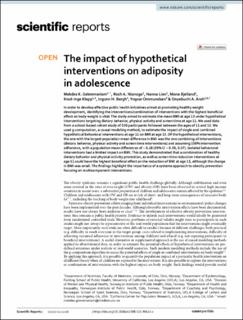The impact of hypothetical interventions on adiposity in adolescence
Gebremariam, Mekdes Kebede; Nianogo, Roch A.; Lien, Nanna; Bjelland, Mona; Klepp, Knut Inge; Bergh, Ingunn Holden; Ommundsen, Yngvar; Arah, Onyebuchi A.
Peer reviewed, Journal article
Published version

View/
Date
2021Metadata
Show full item recordCollections
- Artikler [5061]
- Publikasjoner fra CRIStin FHI [7536]
Abstract
In order to develop effective public health initiatives aimed at promoting healthy weight development, identifying the interventions/combination of interventions with the highest beneficial effect on body weight is vital. The study aimed to estimate the mean BMI at age 13 under hypothetical interventions targeting dietary behavior, physical activity and screen time at age 11. We used data from a school-based cohort study of 530 participants followed between the ages of 11 and 13. We used g-computation, a causal modeling method, to estimate the impact of single and combined hypothetical behavioral interventions at age 11 on BMI at age 13. Of the hypothetical interventions, the one with the largest population mean difference in BMI was the one combining all interventions (dietary behavior, physical activity and screen time interventions) and assuming 100% intervention adherence, with a population mean differences of − 0.28 (95% CI − 0.59, 0.07). Isolated behavioral interventions had a limited impact on BMI. This study demonstrated that a combination of healthy dietary behavior and physical activity promotion, as well as screen time reduction interventions at age 11 could have the highest beneficial effect on the reduction of BMI at age 13, although the change in BMI was small. The findings highlight the importance of a systems approach to obesity prevention focusing on multicomponent interventions.